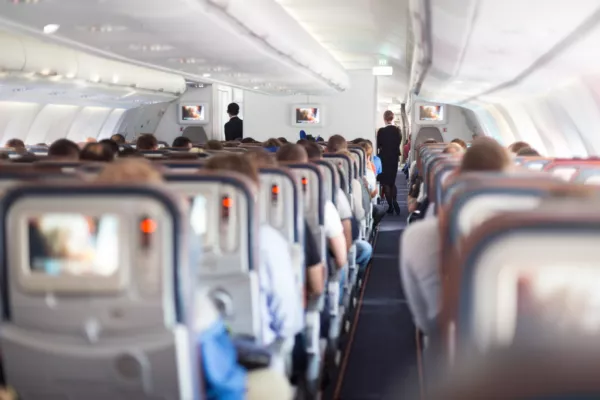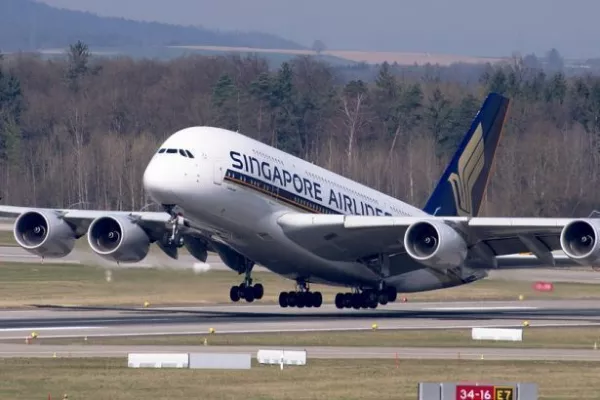IndiGo, Singapore Airlines, Air France-KLM and Japan Airlines have recorded quarterly losses.
IndiGo Parent's Shares Fall Nearly 5% After Record Quarterly Loss
Shares of Interglobe Aviation Ltd, the operator of India's biggest airline IndiGo, fell as much as 4.6% a day after the company posted a record quarterly loss as the COVID-19 pandemic weighed on a nascent recovery.
The New Delhi-based airline's daily average cash burn increased to 334 million rupees in the quarter, and it said scheduled international operations still remained a challenge.
Yields, a metric for profitability, dropped 23.2% to 3.48 rupees in the first quarter, with the company cautioning that the metric would remain under pressure until demand recovers.
"Even as per our airfare tracker, airfares in May'21 tumbled to last year levels and are hovering around average floor bands since the start of Jun'21," analysts at Motilal Oswal said, calling it a "scathing concern."
CEO Ronojoy Dutta told reporters in a post-earnings call that he expects capacity to return to pre-pandemic levels by the end of the year but warned that a third wave of infections could swiftly disrupt things again.
Capacity for the first quarter was up by 433.2% compared to the same period last year, when the company's operations came to a near standstill as India went under a lockdown to curb the spread of the virus.
For the first quarter ended June 2020, capacity was down 90.9% compared to the same period a year earlier.
The company's net loss swelled to 31.79 billion rupees ($426.84 million) in the latest reported quarter, from 28.49 billion rupees a year earlier. This marked the company's sixth consecutive quarterly loss.
IndiGo has reported losses since the pandemic brought global travel to a near-halt and battered airlines worldwide. Just as the airline showed signs of recovery, the sector was hit by the renewed travel restrictions.
Singapore Airlines First-Quarter Loss Narrows On Cargo Demand Boost
Singapore Airlines Ltd (SIA) has recorded a S$409 million ($302 million) first-quarter loss, narrower than a year earlier, helped by a strong air cargo market and no major impairments.
The airline forecast passenger capacity to reach 33% of pre-pandemic levels in the second quarter, and said it would serve at least 50% of locations it did before by the end of September.
The airline, like Hong Kong rival Cathay Pacific Airways Ltd , lacks a domestic market and is solely reliant on international travel at a time when most borders remain closed.
SIA carried 132,600 passengers in the month of June, an improvement on its June 2020 figures but a 96% fall from the same month two years earlier, before the pandemic hit.
It filled just 16.1% of seats in June, with its flights heavily reliant on cargo for revenue at a time when the freight market is strong.
The company posted a record S$1.1 billion loss in the first quarter a year earlier.
Revenue in the just-ended quarter came in at S$1.30 billion, up from S$851 million a year earlier.
Cargo flown revenue grew 32.4% and the company said demand fundamentals for the business remained strong, even though fresh pandemic-related restrictions in parts of the world could cause short-term uncertainty.
SIA, unlike rival national carriers in Southeast Asia, still has a healthy cash balance to help it get through a period of low travel. It recently raised S$6.2 billion of convertible bonds underwritten by its largest shareholder, state investor Temasek Holdings.
The airline also said 98% of active pilots and cabin crew have been vaccinated.
Air France-KLM Narrows Losses As Bookings Begin Recovery
An easing of coronavirus travel restrictions is generating the first signs of recovery at Air France-KLM, the airline group said, as its unveiled a smaller loss for the second quarter coupled with positive cash from operations.
While passengers are returning to the air, uncertainty over COVID-19 rules continues to be a problem. KLM said with a majority of Europeans now fully vaccinated, countries should move quickly to harmonize regulations enabling more air travel.
"Obviously the first quarter was terrible and probably even more so for KLM due to the very specific measure of double testing," Pieter Elbers, head of the group's Dutch unit, said in an interview, referring to a requirement in the Netherlands for passengers to provide two negative tests on return flights.
"In the second [quarter] we see a significant improvement. We see the numbers picking up even within the second quarter, June was better than April and in July, the first week of July, Amsterdam was the busiest airport in Europe," he told Reuters.
But Elbers said people are still reluctant to travel and called for European countries to reopen the borders.
The Franco-Dutch group posted losses before interest, tax, depreciation and amortisation (EBITDA) of €248 million for the quarter - marking a €532-million improvement from heavy losses a year earlier when the pandemic had triggered global lockdowns.
Third-quarter EBITDA is expected to be positive, it said, adding that its medium-term operating margin goal remained unchanged.
With long-haul capacity rising again following the reopening of the North Atlantic to Americans visiting Europe, Air France-KLM now expects capacity at 60%-70% of 2019 levels in the third quarter, compared with 55%-65% estimated in May.
In contrast, British Airways-owner IAG took a more cautious bet, saying summer capacity would rise to 45% of pre-pandemic levels.
With US-bound travel still closed to the majority of Europeans, Air France-KLM, however, held back from giving capacity forecasts for the fourth quarter and called for reciprocity in the opening of borders as well as faster vaccination rollouts worldwide.
While Americans are slowly returning to Europe, Elbers said, "I hope that also the US will open its borders soon again and we can see a further uptick of travel. If I see the trend of the past few months, we can really be kind of positive."
For the first time since the start of the crisis, operating free cashflow after lease repayments was positive at 210 million euros. Both of its main carriers were cash-positive on the back of rising ticket sales.
The group sees "good" summer bookings in Europe, though they are coming in later than usual, chief financial officer Steven Zaat said.
The airline's revenue surged to €2.75 billion from €1.57 billion.
Fuel costs rose by approximately €300 million, mainly due to the extra capacity as well as a slight impact from rises in oil prices, cushioned by more favourable hedge contracts.
Japan Airlines Narrows Q1 Operating Loss To $757m As Costs Fall
Japan Airlines (JAL) has recorded a first-quarter operating loss of 82.65 billion yen ($756.87 million), an improvement from a year earlier, as pandemic-related cost cuts took effect and travel demand rose from a very low base.
Japan's second-biggest airline's result for the three month period that ended on June 30 was worse than an estimate of a 73.5 billion yen loss from five analysts polled by Refinitiv but narrower than the 131 billion yen operating loss in the same quarter last year.
JAL did not provide a full-year earnings forecast, saying uncertainty made prediction too difficult. The carrier could post an annual operating loss of 108.6 billion, according to the average of 10 analysts surveyed by Refinitiv.
The Japanese airline, like other carriers, has been burning through cash reserves to keep jets and workers it will need when travel demand rebounds.
JAL expects its cash burn rate to fall to approximately five billion yen a month in the second quarter from 10 to 15 billion yen a month in the first quarter, Senior Managing Executive Officer Hideki Kikuyuma told reporters.
"As refunds have been decreasing since around June, cash burn is falling," he said. "Depending on the return of domestic passenger demand, we are hopeful that operating cash flow will turn positive in September or so."
Passenger numbers for domestic flights in the April-June quarter more than doubled from the previous year, but were less than a third of pre-pandemic levels as Japan grapples with record levels of COVID-19 cases.
International traffic quadrupled from last year, but passenger numbers totalled only 6.2% of the same quarter two years ago.
One bright spot for the airline has been strong demand for cargo, though JAL does not operate dedicated freighter planes like rival ANA Holdings Inc.
To adapt to what it expects will be a long-term dip in business travel, JAL is expanding budget units that will focus on tourism demand in Asia.
It is also retiring 26 of its older 777 widebodies and adding new Airbus SE A350 jets.
News by Reuters, edited by Hospitality Ireland. Click subscribe to sign up for the Hospitality Ireland print edition.









